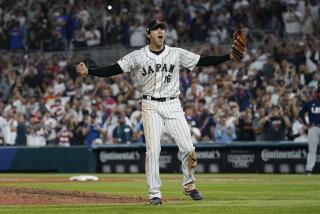NEWS ANALYSIS : Blunt President Insists Japan Yield ‘Results’
- Share via
WASHINGTON — It was a historic shift. In the modern, postwar era, no American President has publicly addressed a Japanese leader as bluntly and insistently as President Clinton did Friday.
After his first meeting with Prime Minister Kiichi Miyazawa, Clinton made it plain that the current economic and trade relationship between the two countries will have to change--and that the United States will be focused less on discussions or initiatives than on “results.”
“I recognize that these are complex issues, but the simple fact is that it is harder to sell in Japan’s market than in ours,” the President declared at a joint press conference, with a grim-faced Miyazawa standing alongside. “America is accepting the challenge of change, and so too must Japan.”
Even before the two men met, Miyazawa’s spokesman already had termed the session “one of the most important, if not the most important” of all the meetings between American and Japanese leaders. Afterward, Clinton’s comments had one senior Japanese journalist talking about the beginning of a “new era” in relations between the two countries.
As Japanese prime ministers so often have done in the past, Miyazawa tried to create the appearance of harmony, asserting that, during their White House meetings, he and Clinton had “built a personal relationship of mutual trust.”
Yet Clinton often refused to play the time-honored American role in this harmony duet, declaring, at one point: “Let’s not paper this over.”
Rather than apologize for some of his recent, negative comments about Japan, Clinton pointedly reminded his audience that the Japanese prime minister earlier this year was reported to have made an equally sardonic quip about America: “Whenever there is a new Administration (in Washington), they always blow a lot of hot air but after several months it quiets down.”
Clinton’s televised remarks appeared to be aimed at sending the message, not just to Miyazawa but to the Japanese public, that his Administration’s emphasis on economics over security ties is not just hot air and will not quiet down. He seemed to be hoping to jar Japan into the realization that the old relationship between the two countries cannot survive if the current trade imbalance persists.
At the same time, during a period when Clinton is pressing politically risky tax increases and reforms in health care, the trade imbalance with Japan is an issue on which he knows he will get overwhelming support from both the American public and the business community.
Most of what Clinton said Friday was a repetition of comments made earlier by others in his Administration, such as U.S. Trade Representative Mickey Kantor and Secretary of State Warren Christopher.
However, if there was any doubt before, Clinton demonstrated that Administration officials are taking their cues on Japan policy from the Oval Office. And Clinton also showed that he is willing to stake his own political reputation on the effort to win “results” from Japan.
Indeed, the President set forth the need to reduce the U.S. deficit with Japan in such a highly public fashion that--if there is no significant change in the trade deficit with Tokyo over the next few years--Clinton almost certainly will be declared ineffective on the issue by political rivals.
“The world needs a strong Japan, the world needs a strong United States, the world needs these two countries to cooperate,” said the President. “And it can only happen if we are making real progress on this trade deficit.”
Of course, Clinton is much freer to concentrate on trade issues, because the United States no longer needs Japan’s help in protecting against a Soviet military threat. In the past, American Presidents always have given stronger emphasis to the security ties and military alliance with Japan than to the economic relationship.
During the last meeting between American and Japanese leaders, when President Bush visited Tokyo in January, 1992, he brought along a delegation of business leaders and raised a series of grievances about the inability of American companies to sell in the Japanese market.
But even then, Bush made plain that security ties were still paramount. At the time, the White House gave its strongest emphasis to a detailed description of the “global partnership” between the United States and Japan and treated the economic friction as a temporary problem that was important only because it could threaten the security ties.
In the days before the Clinton-Miyazawa meeting, senior Japanese officials repeatedly had sought to deflect attention from economic issues. Masamichi Hanabusa, press secretary for the Japanese Foreign Ministry, told a group of American reporters that the United States had become overly obsessed by its trade imbalance with Japan. “Keep a balance between short-term trade interests and other, long-term interests,” he warned.
Yet Clinton was not to be diverted. While acknowledging the continuing importance of American security ties with Japan, he quickly added that it is time to “pay special attention to the economic side of our relationship.”
The questions left unanswered by this first meeting between the two heads of state were how Japan will react to Clinton’s bluntness and whether the new President will be able to succeed in obtaining a major reduction in the trade imbalance.
But from now on, there will be no question about what Clinton wants from Japan or what his priorities are. The sign that was once displayed on the walls of his Arkansas campaign headquarters (“It’s the economy, stupid”) is now hanging over U.S. relations with Japan.
More to Read
Get the L.A. Times Politics newsletter
Deeply reported insights into legislation, politics and policy from Sacramento, Washington and beyond. In your inbox twice per week.
You may occasionally receive promotional content from the Los Angeles Times.










